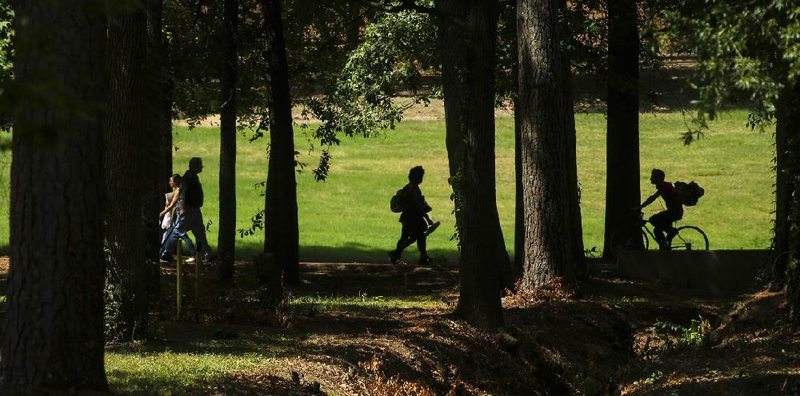Reducing administrative costs, restricting building use and eliminating low-enrollment academic programs are the priorities in paring down the University of Arkansas at Little Rock's budget, Chancellor Christina Drale told University of Arkansas System trustees Friday.
Ultimately, she said, the university must cut its budget strategically, aligning its budget with its mission. That hasn't been done in the past, Drale said, when budget cuts were often thought of as temporary measures.
Drale's announcement came on the same day that trustees accepted an internal system audit.
That 15-page audit critiqued how well the university managed its budgeting system.
[DOCUMENT: UALR audit » arkansasonline.com/1123ualr]
According to the audit, the budget figures that UALR officials inputted into their budgeting software varied wildly from what university system officials were given and from what money was actually available. In one instance, revenue for nine line items was overstated by $20.5 million and expenses by $10.8 million, auditors found.
Some figures recorded in UALR's financial management system, Banner, bordered on impossible. The university informed trustees of an $11.5 million deficit last fiscal year, but Banner recorded a deficit of $126.2 million.
This year, the university will come up about $11 million short of what it actually budgeted, after years of lowering enrollment and basing budgets on enrollment projections that were too optimistic.
Drale hasn't announced specific cuts yet, but Friday she outlined her priorities for resizing the budget.
"Universities are often criticized for spending too much on administration, so the first strategy will be to consolidate, reorganize and downsize to reduce administrative costs overall," Drale said.
Details, such as how administration will be downsized, will come later, Drale said.
For now, UALR leaders are examining how to move personnel and services around to eventually take a few buildings out of service, which would reduce operation and maintenance costs. The Institutional Effectiveness Committee, consisting of 24 faculty and staff members, is preparing recommendations for some low-enrollment programs to cut, and Ann Bain -- the new provost and executive vice chancellor -- will start a focus group to assess community needs and guide academic programming to better meet them.
Drale noted some bright spots for UALR. Compared with this time last year, undergraduate admissions and new freshman admissions have more than doubled, she said. That news was met with applause in UALR's Stella Boyle Smith Auditorium.
Undergraduates accepted for admission in the fall of 2020 total 809 so far, up 119% from last year, when it was 370, according to statistics provided by Cody Decker, interim vice chancellor for student affairs. The number of freshmen accepted for admission in the fall of 2020 is already 439, up 169% from 163 last year.
That's thanks to implementation of an enrollment management system that recruits more aggressively and is better at processing student aid applications, Drale said. Training and better cooperation among UALR departments has helped improve student aid processing, she said.
Also, UALR has hired Linda Teater as executive director of budgeting and financial analysis, Drale said. Teater will report to Vice Chancellor for Finance and Administration Stever McClellan. Her position was created by repurposing an unfilled position, Drale said. The university hasn't had a budget director in years, Drale said, and McClellan had assumed that position.
"I am confident we are on the right path," Drale said. "But it won't happen overnight, and we must make rational projections based on current trends."
UALR, once the state's second-largest public university, is now the fifth-largest. Its enrollment has dropped by several thousand students since 2010. It had 8,507 students this fall, not including high school concurrent or dual enrollees, which have numbered in the hundreds in the past.
THE AUDIT
Auditors chiefly reviewed the fiscal 2019 budget, which was submitted and approved by trustees in early 2018. It was balanced, according to the audit, with estimated revenue and expenditures of $201.2 million. Trustees also approved adjustments during the year.
In addition to variations in the deficits, revenue and expenditures reported, auditors found several other key problems:
• Documentation supporting funds was often missing. Auditors selected a sample of 10 trustee-approved budget adjustments totaling $1.6 million last year and determined that the documentation supporting them did not explain how the amounts were determined.
• The university had a practice of "rolling forward" balances from a previous year's budget into the current year's budget, at the approval of university management. At times, the university didn't have enough money to support the amount rolled forward, auditors found. They recommended that the university stop the practice.
• Not all of the university's units used Banner. The College of Business uses Quicken, and the athletics department uses Quickbooks. Auditors recommended using Workday and for units to stop using external budgeting software.
• Last year, UALR financial leadership sent departments incomplete university budgets that didn't match what trustees had approved. Auditors identified 10 line items that didn't match, totaling $3.7 million.
The audit put the university's practices at a Level 3 risk, meaning $100 million to $500 million wasn't accounted for properly. Level 1 is a risk of less than $10 million, and Level 5 is a risk of more than $1 billion.
UALR has implemented four of the auditors' 14 recommendations. Officials will no longer adjust the trustee-approved budget without approval of the trustees or roll forward previous-year balances, and it will reconcile the trustee-approved budget with the one in Banner, and present only the trustee-approved budget to campus departments.
The other 10 recommendations are scheduled for implementation at various times in the next 13 months.
Some recommendations, such as restricting who has access to Banner, are due for implementation Dec. 31. Others, such as developing policies for budget preparation and switching to Workday, aren't due for completion until March or December of next year.
UALR'S MISSION
Drale emphasized the university's mission Friday.
Educating students of all backgrounds comes first. UALR's student body is split 50-50 between students of traditional and nontraditional ages, she said.
Drale said she is focused on helping those students succeed.
Students need to gain practical experience as part of their educations, she said, and she's been in contact with local community and business leaders to further that concept.
"We provide an educational experience that enables our students however they come to us ... to develop their professional capacity and enhance their social mobility," Drale told trustees.
"Second, we are intentional about contributing to regional growth and well-being through our programs, our applied research and through the education of Arkansans, who will pay it forward and help build a stronger Arkansas," she said.
The third tenet of the university's mission is continuous improvement of the institution. That's been "recently developed in earnest," Drale said, and includes professional development and strategic planning.
Trustees asked a few questions of UALR students at Friday's session. They asked no questions of Drale.
Trustee Kelly Eichler asked one student what would have induced him to apply to UALR sooner, now that he has a few years of experience there as a student.
Kyle Hooks, a computer science master's student, said he would have applied sooner if he'd known how understanding the faculty would be about his autism.
Trustees chairman John Goodson asked the students if they had any regrets about enrolling at UALR.
They said they did not, and expressed appreciation for the hands-on professional opportunities they had received in their respective programs of study.

A Section on 11/23/2019

